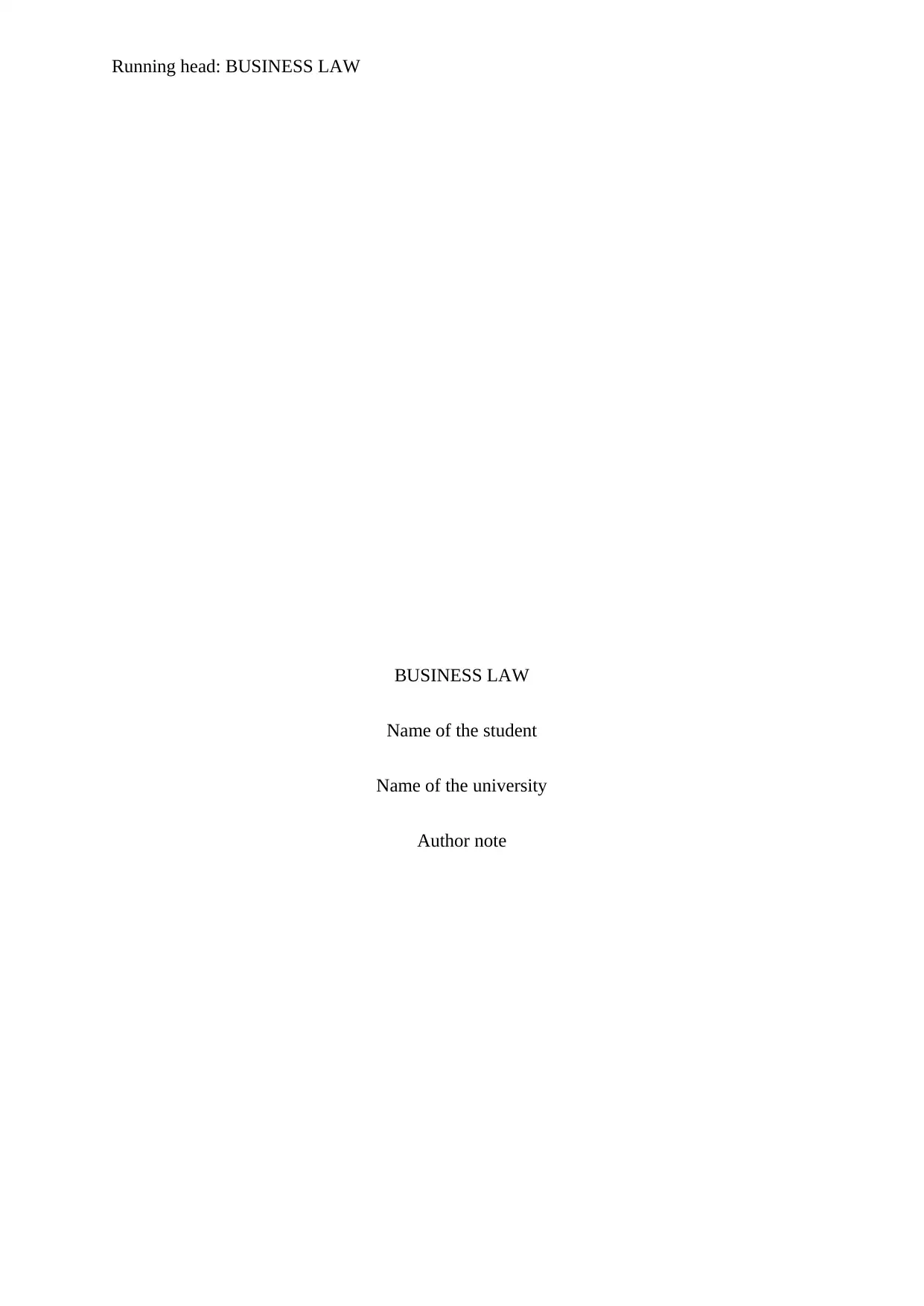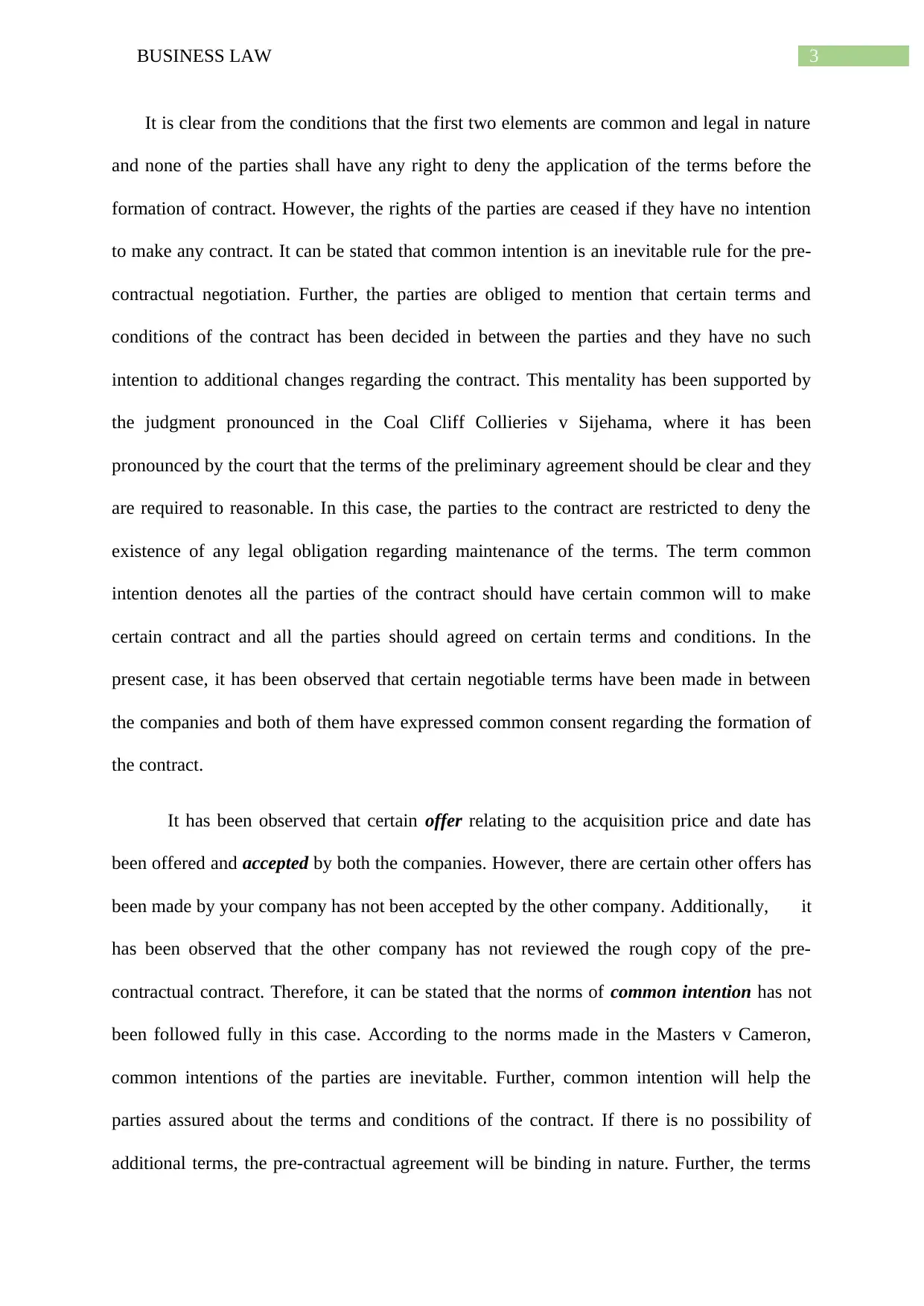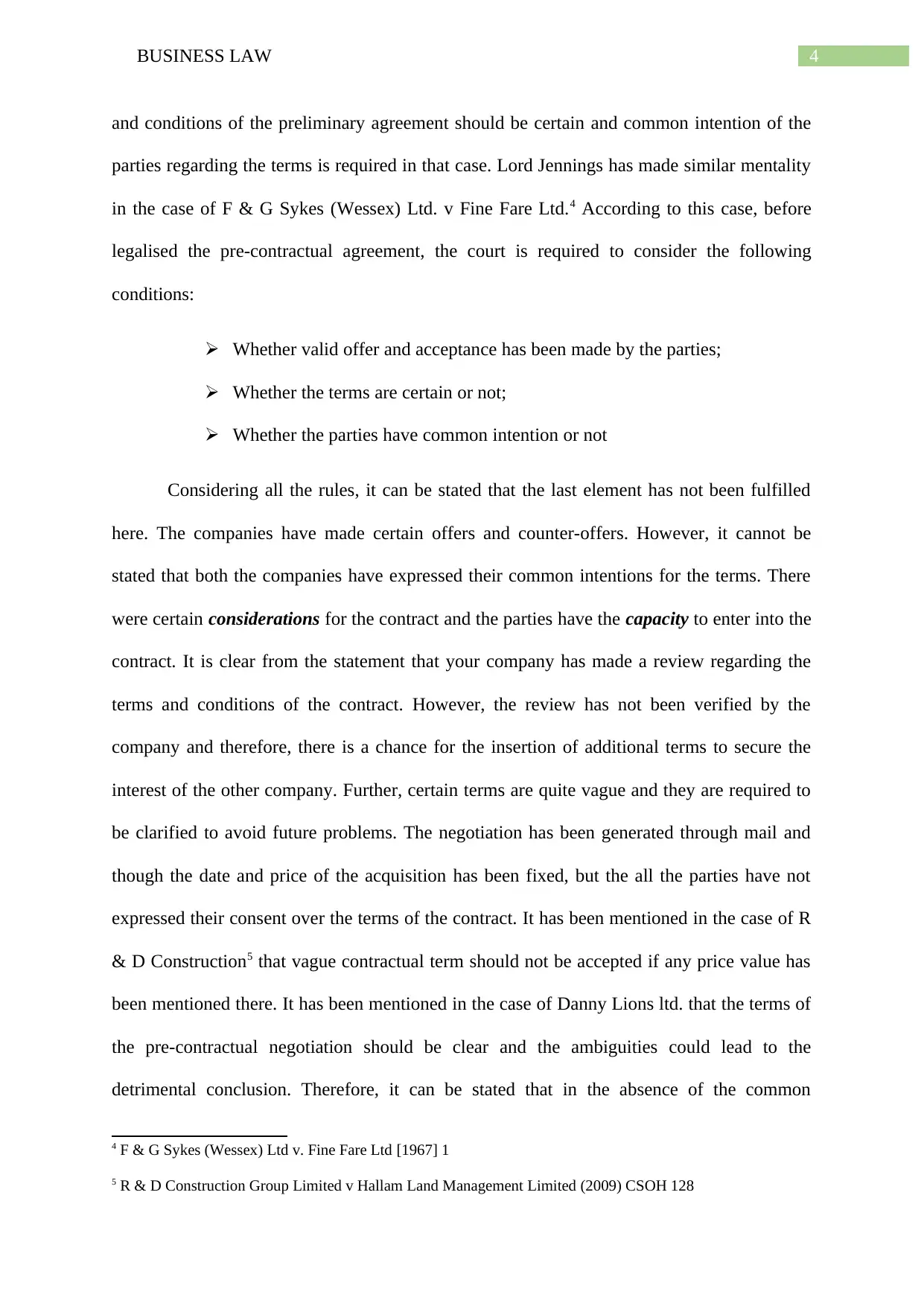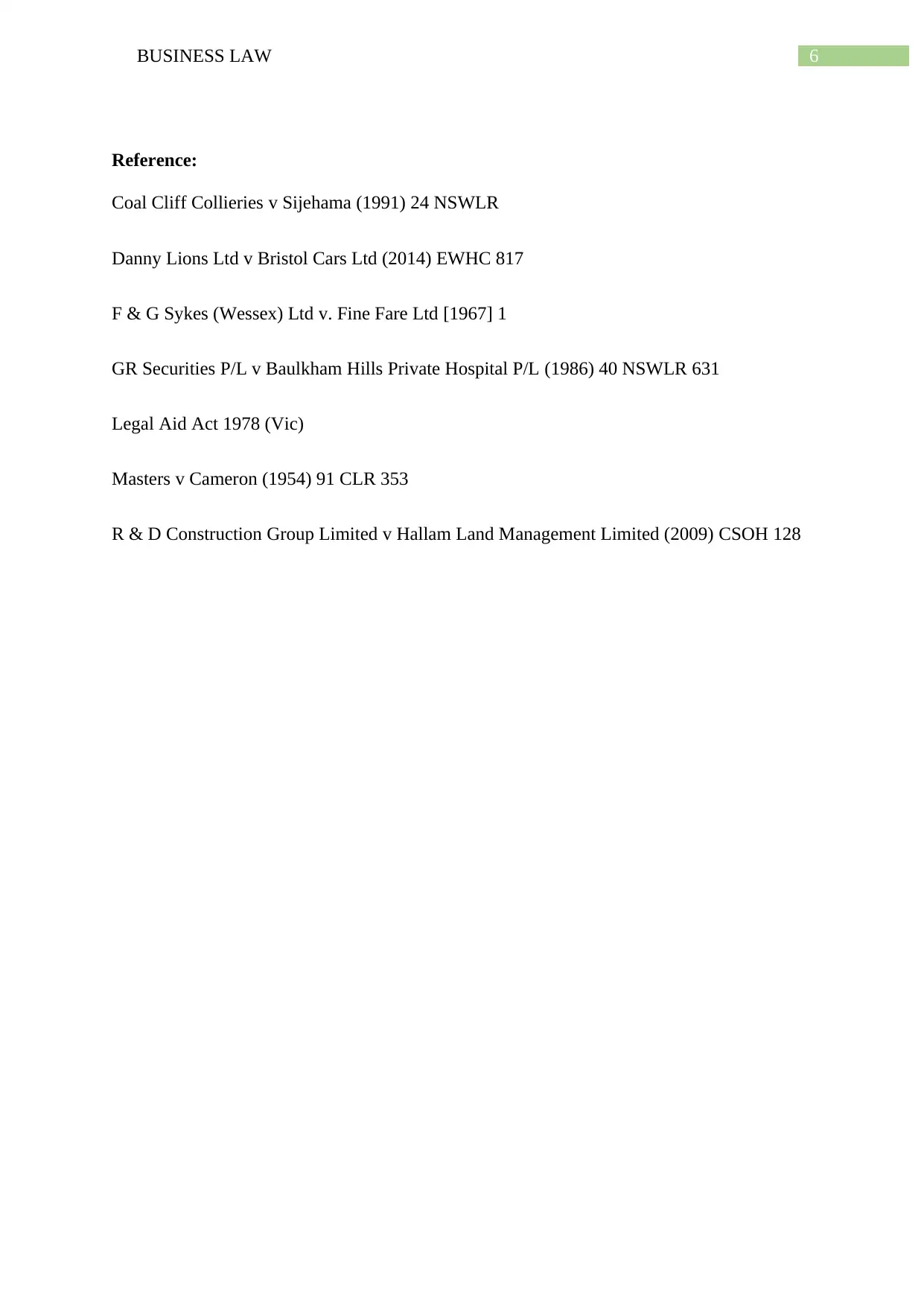Memorandum of Advice on Existence of Contract
VerifiedAdded on 2023/06/08
|7
|1850
|59
AI Summary
This memorandum of advice discusses the existence of a contract between two parties and the legalities involved in pre-contractual negotiations. The case involves a company that made an agreement with another company for development works. However, before the final contract, the other company asked to stop the proceedings, stating that there was no contract between them. The memorandum of advice explains the rules and regulations regarding the formation of a contract and the legal nature of pre-contractual negotiations. It concludes that no contract has been made in this context, but the company can ask for monetary consideration from the alleged company.
Contribute Materials
Your contribution can guide someone’s learning journey. Share your
documents today.

Running head: BUSINESS LAW
BUSINESS LAW
Name of the student
Name of the university
Author note
BUSINESS LAW
Name of the student
Name of the university
Author note
Secure Best Marks with AI Grader
Need help grading? Try our AI Grader for instant feedback on your assignments.

1BUSINESS LAW
Memorandum of Advice
To
Samantha
Subject: Existence of contract
Respected Madam,
Considering the situation faced by you, certain issues have been cropped up and all
the applicable rules are mentioned in the beneath:
Issue:
According to the statements made you, the nature of works of your company (i.e.
Business Acquisition) allows you to make contract with the companies’ development works.
In this present case, an agreement has been made with Rigby Corporate Function Planners
Pty Ltd. (RCFP). The companies have agreed certain terms and conditions and before the
final contract, the company has asked you to stop the further proceedings and it has been
stated that they can discontinue the process, as there is no contract made between them.
Therefore, the main issue that has been arisen in the case is to determine whether a contract
has been made between both the parties or not. Further, it is required to be decided whether
any pre-contractual negotiation has been made in this case or not. This memorandum of
advice will make your queries resolved and you will be able to find out all the answers of the
issues positively.
Rule:
According to the legal definition of the contract, it is an agreement, where the
provisions are legal in nature and imposed mandatorily on the parties to the contract. Under
the principle of common law, a contract can be of written or verbal. Further, not all the
Memorandum of Advice
To
Samantha
Subject: Existence of contract
Respected Madam,
Considering the situation faced by you, certain issues have been cropped up and all
the applicable rules are mentioned in the beneath:
Issue:
According to the statements made you, the nature of works of your company (i.e.
Business Acquisition) allows you to make contract with the companies’ development works.
In this present case, an agreement has been made with Rigby Corporate Function Planners
Pty Ltd. (RCFP). The companies have agreed certain terms and conditions and before the
final contract, the company has asked you to stop the further proceedings and it has been
stated that they can discontinue the process, as there is no contract made between them.
Therefore, the main issue that has been arisen in the case is to determine whether a contract
has been made between both the parties or not. Further, it is required to be decided whether
any pre-contractual negotiation has been made in this case or not. This memorandum of
advice will make your queries resolved and you will be able to find out all the answers of the
issues positively.
Rule:
According to the legal definition of the contract, it is an agreement, where the
provisions are legal in nature and imposed mandatorily on the parties to the contract. Under
the principle of common law, a contract can be of written or verbal. Further, not all the

2BUSINESS LAW
agreements are contract. There are certain elements such as agreement, consideration, and
legal capacity of the parties and intention of the parties. It has been held in Masters v
Cameron1 that in certain time, the pre-contractual negotiation has also formed the part of the
contract. Further, in Coal Cliff Collieries v Sijehama2, court has decided that if the terms of
the pre-contractual negotiation have been agreed between the parties, they could be enforced
between the parties and the negotiation agreement will be binding in nature. In GR Securities
P/L v Baulkham Hills Private Hospital P/L3, the intention of the parties has been supported.
There are certain cases, where the preliminary contract could be enforced legally.
Application:
Considering the above noted rules, it can be stated that the terms and conditions of the
pre-contractual agreements can also form parts of the contract. However, certain rules are
required to be maintained in this case. Three rules are mentioned in Masters v Cameron,
where the legal nature of the negotiating terms have been pointed out. They are as follows:
i. The pre-contractual terms are legal if the terms and conditions of the contract are
valid and clear and the parties have the intention to be bound legally in the
subsequent proceedings;
ii. The pre-contractual terms are legal where the parties have made their relevant terms
and they have no intention to make any additional changes regarding the implied and
express terms and make formal documents thereto;
iii. The pre-contractual terms are not legal if the parties have no such objective to
conclude the bargaining process before the formation of any formal contract.
1 (1954) 91 CLR 353
2 (1991) 24 NSWLR
3 (1986) 40 NSWLR 631
agreements are contract. There are certain elements such as agreement, consideration, and
legal capacity of the parties and intention of the parties. It has been held in Masters v
Cameron1 that in certain time, the pre-contractual negotiation has also formed the part of the
contract. Further, in Coal Cliff Collieries v Sijehama2, court has decided that if the terms of
the pre-contractual negotiation have been agreed between the parties, they could be enforced
between the parties and the negotiation agreement will be binding in nature. In GR Securities
P/L v Baulkham Hills Private Hospital P/L3, the intention of the parties has been supported.
There are certain cases, where the preliminary contract could be enforced legally.
Application:
Considering the above noted rules, it can be stated that the terms and conditions of the
pre-contractual agreements can also form parts of the contract. However, certain rules are
required to be maintained in this case. Three rules are mentioned in Masters v Cameron,
where the legal nature of the negotiating terms have been pointed out. They are as follows:
i. The pre-contractual terms are legal if the terms and conditions of the contract are
valid and clear and the parties have the intention to be bound legally in the
subsequent proceedings;
ii. The pre-contractual terms are legal where the parties have made their relevant terms
and they have no intention to make any additional changes regarding the implied and
express terms and make formal documents thereto;
iii. The pre-contractual terms are not legal if the parties have no such objective to
conclude the bargaining process before the formation of any formal contract.
1 (1954) 91 CLR 353
2 (1991) 24 NSWLR
3 (1986) 40 NSWLR 631

3BUSINESS LAW
It is clear from the conditions that the first two elements are common and legal in nature
and none of the parties shall have any right to deny the application of the terms before the
formation of contract. However, the rights of the parties are ceased if they have no intention
to make any contract. It can be stated that common intention is an inevitable rule for the pre-
contractual negotiation. Further, the parties are obliged to mention that certain terms and
conditions of the contract has been decided in between the parties and they have no such
intention to additional changes regarding the contract. This mentality has been supported by
the judgment pronounced in the Coal Cliff Collieries v Sijehama, where it has been
pronounced by the court that the terms of the preliminary agreement should be clear and they
are required to reasonable. In this case, the parties to the contract are restricted to deny the
existence of any legal obligation regarding maintenance of the terms. The term common
intention denotes all the parties of the contract should have certain common will to make
certain contract and all the parties should agreed on certain terms and conditions. In the
present case, it has been observed that certain negotiable terms have been made in between
the companies and both of them have expressed common consent regarding the formation of
the contract.
It has been observed that certain offer relating to the acquisition price and date has
been offered and accepted by both the companies. However, there are certain other offers has
been made by your company has not been accepted by the other company. Additionally, it
has been observed that the other company has not reviewed the rough copy of the pre-
contractual contract. Therefore, it can be stated that the norms of common intention has not
been followed fully in this case. According to the norms made in the Masters v Cameron,
common intentions of the parties are inevitable. Further, common intention will help the
parties assured about the terms and conditions of the contract. If there is no possibility of
additional terms, the pre-contractual agreement will be binding in nature. Further, the terms
It is clear from the conditions that the first two elements are common and legal in nature
and none of the parties shall have any right to deny the application of the terms before the
formation of contract. However, the rights of the parties are ceased if they have no intention
to make any contract. It can be stated that common intention is an inevitable rule for the pre-
contractual negotiation. Further, the parties are obliged to mention that certain terms and
conditions of the contract has been decided in between the parties and they have no such
intention to additional changes regarding the contract. This mentality has been supported by
the judgment pronounced in the Coal Cliff Collieries v Sijehama, where it has been
pronounced by the court that the terms of the preliminary agreement should be clear and they
are required to reasonable. In this case, the parties to the contract are restricted to deny the
existence of any legal obligation regarding maintenance of the terms. The term common
intention denotes all the parties of the contract should have certain common will to make
certain contract and all the parties should agreed on certain terms and conditions. In the
present case, it has been observed that certain negotiable terms have been made in between
the companies and both of them have expressed common consent regarding the formation of
the contract.
It has been observed that certain offer relating to the acquisition price and date has
been offered and accepted by both the companies. However, there are certain other offers has
been made by your company has not been accepted by the other company. Additionally, it
has been observed that the other company has not reviewed the rough copy of the pre-
contractual contract. Therefore, it can be stated that the norms of common intention has not
been followed fully in this case. According to the norms made in the Masters v Cameron,
common intentions of the parties are inevitable. Further, common intention will help the
parties assured about the terms and conditions of the contract. If there is no possibility of
additional terms, the pre-contractual agreement will be binding in nature. Further, the terms
Secure Best Marks with AI Grader
Need help grading? Try our AI Grader for instant feedback on your assignments.

4BUSINESS LAW
and conditions of the preliminary agreement should be certain and common intention of the
parties regarding the terms is required in that case. Lord Jennings has made similar mentality
in the case of F & G Sykes (Wessex) Ltd. v Fine Fare Ltd.4 According to this case, before
legalised the pre-contractual agreement, the court is required to consider the following
conditions:
Whether valid offer and acceptance has been made by the parties;
Whether the terms are certain or not;
Whether the parties have common intention or not
Considering all the rules, it can be stated that the last element has not been fulfilled
here. The companies have made certain offers and counter-offers. However, it cannot be
stated that both the companies have expressed their common intentions for the terms. There
were certain considerations for the contract and the parties have the capacity to enter into the
contract. It is clear from the statement that your company has made a review regarding the
terms and conditions of the contract. However, the review has not been verified by the
company and therefore, there is a chance for the insertion of additional terms to secure the
interest of the other company. Further, certain terms are quite vague and they are required to
be clarified to avoid future problems. The negotiation has been generated through mail and
though the date and price of the acquisition has been fixed, but the all the parties have not
expressed their consent over the terms of the contract. It has been mentioned in the case of R
& D Construction5 that vague contractual term should not be accepted if any price value has
been mentioned there. It has been mentioned in the case of Danny Lions ltd. that the terms of
the pre-contractual negotiation should be clear and the ambiguities could lead to the
detrimental conclusion. Therefore, it can be stated that in the absence of the common
4 F & G Sykes (Wessex) Ltd v. Fine Fare Ltd [1967] 1
5 R & D Construction Group Limited v Hallam Land Management Limited (2009) CSOH 128
and conditions of the preliminary agreement should be certain and common intention of the
parties regarding the terms is required in that case. Lord Jennings has made similar mentality
in the case of F & G Sykes (Wessex) Ltd. v Fine Fare Ltd.4 According to this case, before
legalised the pre-contractual agreement, the court is required to consider the following
conditions:
Whether valid offer and acceptance has been made by the parties;
Whether the terms are certain or not;
Whether the parties have common intention or not
Considering all the rules, it can be stated that the last element has not been fulfilled
here. The companies have made certain offers and counter-offers. However, it cannot be
stated that both the companies have expressed their common intentions for the terms. There
were certain considerations for the contract and the parties have the capacity to enter into the
contract. It is clear from the statement that your company has made a review regarding the
terms and conditions of the contract. However, the review has not been verified by the
company and therefore, there is a chance for the insertion of additional terms to secure the
interest of the other company. Further, certain terms are quite vague and they are required to
be clarified to avoid future problems. The negotiation has been generated through mail and
though the date and price of the acquisition has been fixed, but the all the parties have not
expressed their consent over the terms of the contract. It has been mentioned in the case of R
& D Construction5 that vague contractual term should not be accepted if any price value has
been mentioned there. It has been mentioned in the case of Danny Lions ltd. that the terms of
the pre-contractual negotiation should be clear and the ambiguities could lead to the
detrimental conclusion. Therefore, it can be stated that in the absence of the common
4 F & G Sykes (Wessex) Ltd v. Fine Fare Ltd [1967] 1
5 R & D Construction Group Limited v Hallam Land Management Limited (2009) CSOH 128

5BUSINESS LAW
intention, the preliminary agreement cannot be legalised according to the judgment of
Masters v Cameron.
Conclusion:
Considering all the existed rules and case citations, it is advised to you that no hints
regarding the consent of both the parties have been made between both the companies. It is
quite clear from your statement that you have spent much time behind the acquisition process
of the company and in this matter; certain offers have been made and accepted by both the
parties. However, the primary requirements regarding legalise the pre-contractual negotiation
is the common intentions of the parties. Further, there should be certainty regarding the
addition or termination of the contractual terms. In the words of Lord Jennings, it can be
stated that the parties should clarify their terms regarding the subsequent event of contract.
However, in this case, it has been stated that there are many provisions in the pre-negotiation
agreement that are vague in nature. Further, consent has not been derived from the other
party. Hence, it can be stated that the case has clarified the non-maintenance of all the
required terms for the validity of the legal version of the pre-contractual contracts. However,
a negotiation process has been taken into place in between the parties. At the very inception
of your case, it has been observed that certain offers have been made by you and accepted by
the other party. Further, the date for the acquisition and price has been mentioned during this
time. Therefore, the other company could not deny all its liability. The court could pass
decree for the existence of the negotiation and after considering the facts of the case, the
court can penalise the other company. However, no exact intention of both the parties have
been observed and therefore, the legality of the pre-contractual negotiation is not established
here. In this case, you are advised that no contract have been made in this context. However,
the company can ask for monetary consideration from the alleged company.
intention, the preliminary agreement cannot be legalised according to the judgment of
Masters v Cameron.
Conclusion:
Considering all the existed rules and case citations, it is advised to you that no hints
regarding the consent of both the parties have been made between both the companies. It is
quite clear from your statement that you have spent much time behind the acquisition process
of the company and in this matter; certain offers have been made and accepted by both the
parties. However, the primary requirements regarding legalise the pre-contractual negotiation
is the common intentions of the parties. Further, there should be certainty regarding the
addition or termination of the contractual terms. In the words of Lord Jennings, it can be
stated that the parties should clarify their terms regarding the subsequent event of contract.
However, in this case, it has been stated that there are many provisions in the pre-negotiation
agreement that are vague in nature. Further, consent has not been derived from the other
party. Hence, it can be stated that the case has clarified the non-maintenance of all the
required terms for the validity of the legal version of the pre-contractual contracts. However,
a negotiation process has been taken into place in between the parties. At the very inception
of your case, it has been observed that certain offers have been made by you and accepted by
the other party. Further, the date for the acquisition and price has been mentioned during this
time. Therefore, the other company could not deny all its liability. The court could pass
decree for the existence of the negotiation and after considering the facts of the case, the
court can penalise the other company. However, no exact intention of both the parties have
been observed and therefore, the legality of the pre-contractual negotiation is not established
here. In this case, you are advised that no contract have been made in this context. However,
the company can ask for monetary consideration from the alleged company.

6BUSINESS LAW
Reference:
Coal Cliff Collieries v Sijehama (1991) 24 NSWLR
Danny Lions Ltd v Bristol Cars Ltd (2014) EWHC 817
F & G Sykes (Wessex) Ltd v. Fine Fare Ltd [1967] 1
GR Securities P/L v Baulkham Hills Private Hospital P/L (1986) 40 NSWLR 631
Legal Aid Act 1978 (Vic)
Masters v Cameron (1954) 91 CLR 353
R & D Construction Group Limited v Hallam Land Management Limited (2009) CSOH 128
Reference:
Coal Cliff Collieries v Sijehama (1991) 24 NSWLR
Danny Lions Ltd v Bristol Cars Ltd (2014) EWHC 817
F & G Sykes (Wessex) Ltd v. Fine Fare Ltd [1967] 1
GR Securities P/L v Baulkham Hills Private Hospital P/L (1986) 40 NSWLR 631
Legal Aid Act 1978 (Vic)
Masters v Cameron (1954) 91 CLR 353
R & D Construction Group Limited v Hallam Land Management Limited (2009) CSOH 128
1 out of 7
Related Documents
Your All-in-One AI-Powered Toolkit for Academic Success.
+13062052269
info@desklib.com
Available 24*7 on WhatsApp / Email
![[object Object]](/_next/static/media/star-bottom.7253800d.svg)
Unlock your academic potential
© 2024 | Zucol Services PVT LTD | All rights reserved.





